It was a wet late afternoon when we visited this imitation of a French Chateau: Waddesdon Manor.
The Rothschilds bear the brunt of many conspiracy theories, but the builder of Waddesdon was a remarkable man. Ferdinand de Rothschild, born in Paris in 1839, married his second cousin, Evelina de Rothschild, and assumed British nationality in 1865. On December 4th, 1866, Evelina gave birth to a son, and one can only imagine Ferdinand’s happiness—and despair when mother and child died the same day. Ferdinand himself died on his 59th birthday, thought to be the result of a cold caught when visiting his wife’s tomb.
Even so, a marble Conservatory must compensate to some extent, along with the rest of this Ali Baba's Cave.
An organ clock portraying Orpheus with internal mechanism that plays tunes circa 1785
Close up of one corner of the dining room
From the Breakfast Room above, you can see the entire length of the house to the Baron's Room. Male guests would have had their breakfast here. Ladies had theirs in bed. Food was brought in through a pair of small doors in the corner panelling.
The Grey Drawing Room was where the ladies would withdraw to, while the men enjoyed port in the Dining Room. Sufficiently tanked up, they would rejoin the ladies for conversation, cards and sometimes dancing.
Walking along the West Gallery to the West Hall below you will see:
More clocks and Sèvres porcelain than you can shake a stick at, treasures and tapestries galore.
Ferdinand, I think, illustrates a life well spent. In memory of his wife’s death, he endowed the Evelina Hospital for Sick Children in Southwark, pursued other works of charity and became an obsessive collector of art. As a Trustee of the British Museum, he bequeathed his ‘Renaissance Collection’ to the institution on his death.
In 1874, he bought land in the village of Waddesdon from the Duke of Marlborough, levelled a substantial hill, and built Waddesdon Manor in order to house his collection. Built between 1874 and 1889 its design was based on Chateau de Chambord in France. It was very much a labour of love—as it was for us traipsing round room after opulent room.
A bathroom with its own fire
How successfully did a Jewish financier fit in the largely antisemitic English culture of the time?
It’s likely Trollope borrowed aspects of Ferdinand Rothschild in his creation of his fictional financier Melmotte, in The Way We Live Now, a man who comes to a sticky end when trying to establish himself as a landed gentleman. But the brunt of Trollope’s attack – as it is on Ferdinand Lopez in The Prime Minister—is not on their ethnicity but on the character's lack of roots—the foundation stone of Trollope’s world. In all his books, the villain, irrespective of religion or race is the one who lacks or undervalues duty and a rooted community.
For those who go for the knee-jerk reaction that Trollope was anti semitic, it's worth pointing out that Rothschild was a close friend of Trollope, along with John Everet Millais, Sir Arthur Sullivan (of Gilbert and Sullivan fame) Robert Browning, and the American Ambassador in London. He was friendly with Gladstone and Disraeli, and also the Prince of Wales. In other words Rothschilds were accepted—money perhaps—but in Ferdinand’s case because he hunted, put down roots and accepted the concept of duty.
Towards the end of his life, he became keenly aware of dying without a male heir, and bequeathed his estate to his younger sister, the formidable Alice who had no hesitation in telling off Queen Victoria for stepping on one of her flowers. Well worth reading about, here and here. As I said, formidable and would have seen off Harvey Weinstein.
Lady Alice
Lady Alice's spectacular collection of arms and armour. She positioned it here to create an appropriately masculine approach to the Smoking and Billiards Rooms used by male guests.
The Bachelor's Wing has ten bedrooms for single male guests, 15 bedrooms for permanent male staff and visiting servants and two rooms dedicated to masculine pastimes of smoking and billiards. The leather coated sofa is on a raised platform, incorporating heating grills, for better viewing of the game.
And finally, and possibly of less interest to hard smoking, hard drinking bachelors, other treasures of Waddesdon. Raffles, eat your heart out.
The melancholy returned with a vengeance a year before his death:
‘...future generation may reap the chief benefit of a work which to time has been a labour of love, though I fear Waddesdon will share the fate of most properties whose owners have no descendants and fall into decay. May the day yet be distant when weeds will spread over the garden, the terraces crumble into dust, the pictures and cabinets cross the Channel or the Atlantic, and the melancholy cry of the night-jar sound from the deserted towers.' Ferdinand Rothschild, 1897.
I think he
'The Mummy: Tomb of the Dragon Emperor,' 'Frankenstein,' and Sherlock Holmes.'
If this is an overlong post, it was harder on our feet, minds, and iPhone batteries, but worth it, I hope.


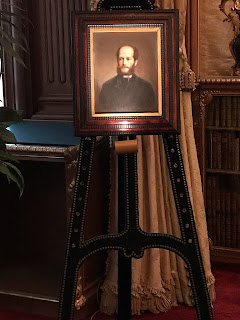




















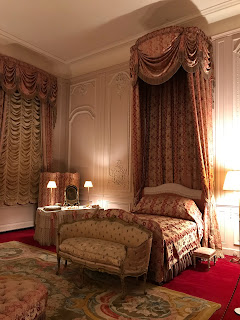



.png)









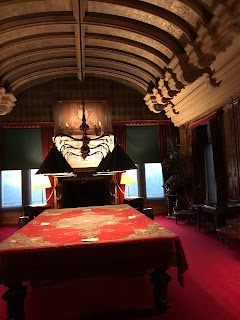


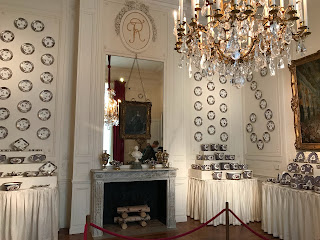

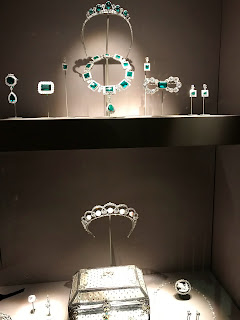


2 comments:
Rich or poor, in the end, you still die, and you can still lose your loved ones.
But what loot! It boggles me people can have so much money.
Bernadette agrees with you. Then again, you might say better them than the state
Or am I being cynical 😀?
Post a Comment